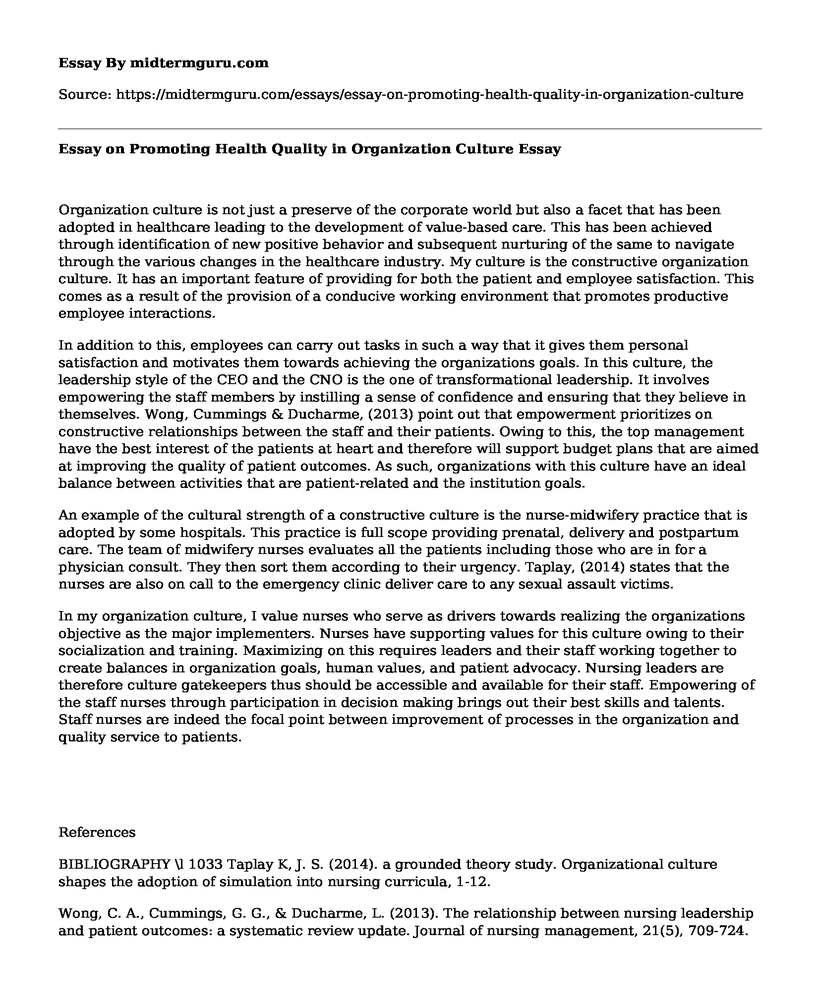Organization culture is not just a preserve of the corporate world but also a facet that has been adopted in healthcare leading to the development of value-based care. This has been achieved through identification of new positive behavior and subsequent nurturing of the same to navigate through the various changes in the healthcare industry. My culture is the constructive organization culture. It has an important feature of providing for both the patient and employee satisfaction. This comes as a result of the provision of a conducive working environment that promotes productive employee interactions.
In addition to this, employees can carry out tasks in such a way that it gives them personal satisfaction and motivates them towards achieving the organizations goals. In this culture, the leadership style of the CEO and the CNO is the one of transformational leadership. It involves empowering the staff members by instilling a sense of confidence and ensuring that they believe in themselves. Wong, Cummings & Ducharme, (2013) point out that empowerment prioritizes on constructive relationships between the staff and their patients. Owing to this, the top management have the best interest of the patients at heart and therefore will support budget plans that are aimed at improving the quality of patient outcomes. As such, organizations with this culture have an ideal balance between activities that are patient-related and the institution goals.
An example of the cultural strength of a constructive culture is the nurse-midwifery practice that is adopted by some hospitals. This practice is full scope providing prenatal, delivery and postpartum care. The team of midwifery nurses evaluates all the patients including those who are in for a physician consult. They then sort them according to their urgency. Taplay, (2014) states that the nurses are also on call to the emergency clinic deliver care to any sexual assault victims.
In my organization culture, I value nurses who serve as drivers towards realizing the organizations objective as the major implementers. Nurses have supporting values for this culture owing to their socialization and training. Maximizing on this requires leaders and their staff working together to create balances in organization goals, human values, and patient advocacy. Nursing leaders are therefore culture gatekeepers thus should be accessible and available for their staff. Empowering of the staff nurses through participation in decision making brings out their best skills and talents. Staff nurses are indeed the focal point between improvement of processes in the organization and quality service to patients.
References
BIBLIOGRAPHY \l 1033 Taplay K, J. S. (2014). a grounded theory study. Organizational culture shapes the adoption of simulation into nursing curricula, 1-12.
Wong, C. A., Cummings, G. G., & Ducharme, L. (2013). The relationship between nursing leadership and patient outcomes: a systematic review update. Journal of nursing management, 21(5), 709-724.
Cite this page
Essay on Promoting Health Quality in Organization Culture. (2021, Jun 17). Retrieved from https://midtermguru.com/essays/essay-on-promoting-health-quality-in-organization-culture
If you are the original author of this essay and no longer wish to have it published on the midtermguru.com website, please click below to request its removal:
- Product Comparison in Terms of Packaging Bottles Designs of Shaving Creams
- Whether Human Immunodeficiency Infection Causes Aids - Paper Example
- Reflection of the Patient During Practicum Experience: Gastroesophageal Reflux Disease
- Paper Example on DNA Repair as a Critical Tumor Suppressor Function
- Research Paper on Type 1 Diabetes
- How Has the Role of the Strategic Planner Changed Over the Past Few Decades? - Essay Sample
- Alpha Phi Alpha: Pioneers of African-American Fraternity & Leadership - Essay Sample







